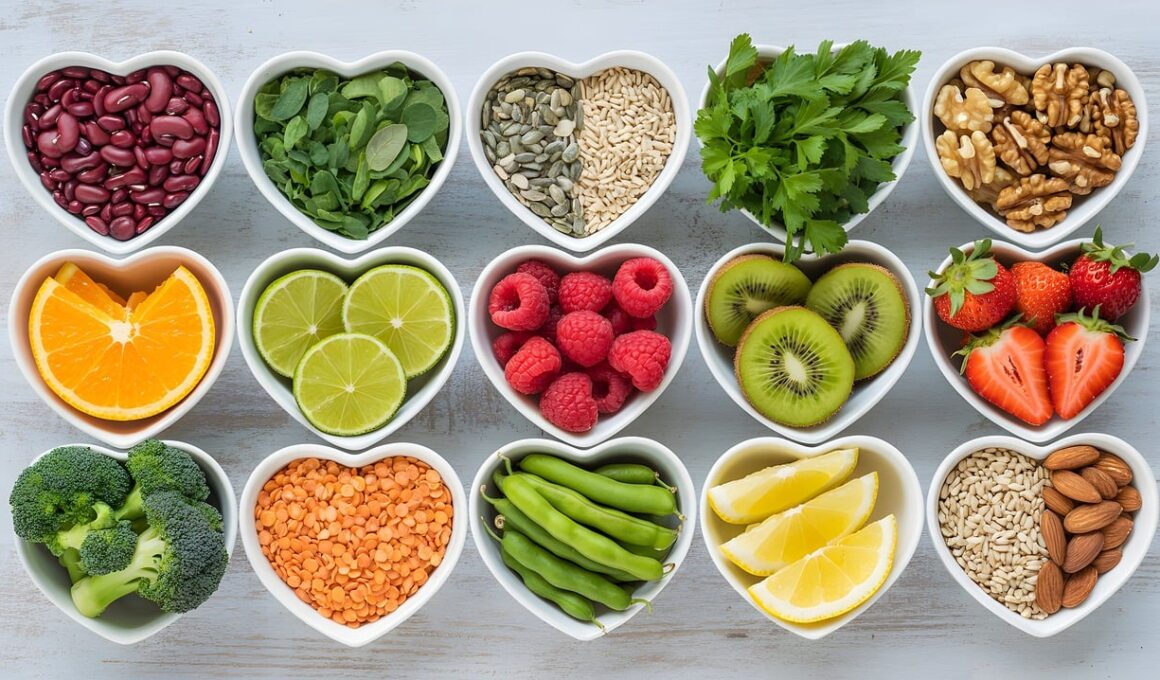Meal Prep Tips for Stress-Free Eating Throughout the Week
Meal prepping is an effective strategy that can significantly enhance your diet while managing stress. This process involves preparing meals in advance, which saves time and effort during busy weekdays. The foundation of a successful meal prep includes having the right ingredients on hand. Start by selecting some wholesome, nutrient-dense foods like lean proteins, whole grains, and plenty of fruits and vegetables. Make a detailed shopping list to ensure you acquire everything needed. When you have all your ingredients ready, designate a specific day for prep. Many find Sundays ideal, as it sets the tone for the week ahead. Keep meals balanced by including a protein source, healthy fats, and fiber. For instance, grilled chicken with quinoa and broccoli is a fantastic option. Don’t forget to vary your meals to prevent boredom; this is where creativity comes into play. Try new recipes or flavor combinations each week. Utilizing proper storage containers is crucial to maintain freshness. Additionally, label and date your meals to keep track of what you’ll be eating each day.
Another key aspect of stress management linked to diet is being mindful of portion sizes. When you prepare meals in advance, it’s easy to serve consistent portions, helping avoid overeating. Consider using a scale or measuring cups during your prep to ensure proper serving sizes. This helps manage caloric intake, which is essential for maintaining a healthy weight. With each meal package, aim for a colorful plate showcasing various food groups. Bright, vibrant colors often indicate a range of nutrients beneficial to overall health. Besides physical health benefits, meal prepping can also have a positive effect on mental well-being, providing a sense of accomplishment. Before diving into meal prep, think about your tastes. Creating meals you enjoy can make a significant difference in your sustainability. Look for healthy recipes online or in cookbooks that align with your palate. Take note of nutrients that help with stress reduction, including Omega-3 fatty acids and antioxidants, found in items like salmon and berries. Consult a nutritionist if you’re uncertain about achieving balance and variety in your meals.
Utilizing Kitchen Tools Effectively
When it comes to meal prepping, the right kitchen tools can create a significant impact. Invest in high-quality containers that are microwave-safe, leak-proof, and stackable. These tools should be of various sizes, allowing flexibility for different meal types. Glass containers are often preferred for meal prep due to their durability and non-reactive properties. Furthermore, a good set of kitchen knives can streamline ingredient preparation, making the chopping process faster and less frustrating. A slow cooker or instant pot can be beneficial in saving time, allowing you to cook larger batches. Additionally, consider using a food processor for preparing sauces or chopping vegetables quickly. Just as important is a set of measuring spoons and cups, which aids in ensuring accuracy while preparing meals. Also, having a digital kitchen scale can assist in portioning out meal components effectively. Lastly, ensure that your workspace is organized and efficient. This level of organization will not just enhance productivity but also lessen stress while preparing your meals. A clean kitchen is a source of inspiration and a conducive environment for healthy cooking.
Listening to your body’s cues concerning hunger is essential in managing stress through diet. Meal prepping can help you become more in tune with your needs by fostering regular eating habits. Many people experience stress-related eating, where they consume food for comfort rather than nourishment. By having pre-prepared, healthy meals ready to go, you can prevent impulsive eating decisions. A great strategy is to incorporate snacks into your meal prep routine. For instance, prepare small packs of nuts, carrots, and hummus, or yogurt with berries, which can curb hunger between meals effectively. Remember to hydrate as well, as drinking water is often overlooked. Planning hydration with meals enhances physical well-being and reduces feelings of stress. Visual cues, like placing water bottles in your meal prep containers, can remind you to drink more often. Along with hydration and snacks, consider preparing a list of go-to meals. This resource aids in making quick decisions during moments of stress, placing you in control of your eating habits. Overall, the key is to maintain a balanced approach tailored to your individual needs and schedule.
Incorporating Meal Prep into Your Lifestyle
To truly benefit from meal prep in your weekly routine, assess your lifestyle and preferences. Finding a strategy that complements your schedule is imperative for sustainability. Do you have time to dedicate to cooking all in one day, or would breaking it into two days be more practical? Experiment with different prep styles to see what works best for you. It’s also essential to involve family or roommates in the process if applicable. Cooking together can turn meal prepping into a fun, collaborative experience, reducing the overall stress. Additionally, consider the days that you typically feel the most overwhelmed. Preparing extra meals on those days can provide reassurance and support when life’s demands seem overwhelming. Make sure your plan is flexible; life can throw unexpected challenges your way. Hence, you might need to swap meals or change your prep day occasionally. Keep a running list of recipes and meals that you would like to try or modify to keep things fresh and exciting. This adaptability ensures you remain committed to your healthy eating goals, even when faced with obstacles.
Creating a positive mindset is crucial when navigating stress management through diet. Acknowledge the effort you put into meal prepping and celebrate the small victories. Each healthy meal prepared in advance is a stepping stone toward achieving greater mental and physical wellness. Visualizing how the meals will benefit you can motivate further commitment to the process. Additionally, maintaining a food journal can aid in tracking not just what you eat, but how you feel after each meal. This practice establishes patterns that can highlight which foods improve your mood or contribute to stress. Share your journey with friends or family; this network can offer support and encouragement. Join meal prep groups online or follow social media accounts focused on healthy eating and stress management. Surrounding yourself with like-minded individuals fosters a sense of community. Students, professionals, or anyone feeling overwhelmed can especially benefit from utilizing meal prep as a stress-reduction tool. Remember to treat yourself occasionally too; depriving yourself of favorite meals can lead to burnout. Balancing discipline with indulgence is key to a sustainable, healthy lifestyle.
Conclusion: Finding Balance in Meal Prep
In conclusion, meal prepping can be an invaluable tool for managing stress. By taking the time to prepare your meals, you not only save time but also create a routine that aligns with your dietary goals. Being organized, utilizing proper kitchen tools, and maintaining a flexible mindset allow you to thrive rather than merely survive through stressful weeks. Balancing nutrition, portion sizes, and mindful eating will empower you in your journey toward a less stressful relationship with food. Adapt the meal prep strategies discussed to suit your lifestyle, and don’t hesitate to tweak them as necessary. Make healthy eating enjoyable by experimenting with new recipes and incorporating flavorful ingredients. Strive to cultivate a positive association with your meals not just for the physical benefits, but for emotional satisfaction also. Remember, the ultimate goal is to foster a comforting, nutritious environment that supports your overall well-being. Encourage family involvement and share your experiences to further enrich your journey. A commitment to meal prep represents a commitment to your health and happiness. Take it one step at a time, adapting as needed, and ultimately, enjoy this rewarding practice.
Throughout your journey of stress management and eating, never forget the powerful connection between food, mood, and overall mental health. By focusing on nutritious whole foods and using the meal prep tips outlined, you can take control of your eating habits. Establishing a healthy lifestyle not only protects your body but also empowers your mind. Regular meal prepping cultivates an environment in which healthy choices become habitual, significantly reducing the tendency to resort to unhealthy snacks during times of stress. Always reinforce your resolve with a clear intention behind your meal choices, as it fosters a relationship based on respect for your body and its needs. Keep learning about nutrition and exploring various dietary options that resonate with you. Engage with online resources for advice and encouragement while navigating through meal prep. A well-balanced, nutritious diet is paramount in supporting an active lifestyle, ultimately bringing joy during chaotic weeks. Moreover, allow yourself grace on days when things don’t go as planned. Growth requires patience and understanding, so treat every setback as part of the journey. As you embark on this venture, hold onto the belief that each meal prepared and enjoyed represents a step forward in reducing stress and promoting well-being.


